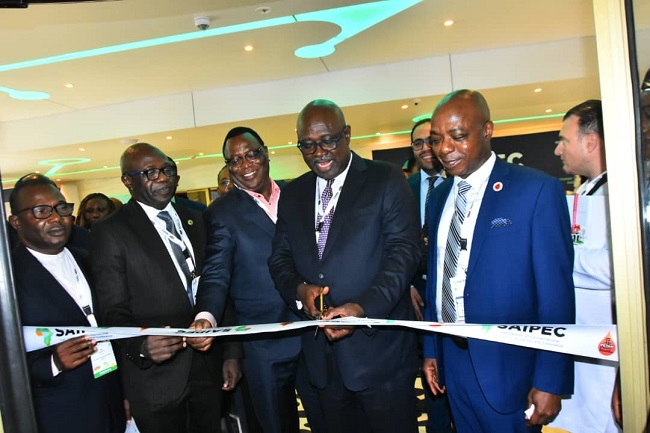Group Chief Executive Officer of the Nigeria National Petroleum Company (NNPCL), Malam Mele Kyari, has reiterated the company’s commitment to strengthening collaboration with stakeholders in the oil and gas sector.

He said this on Tuesday, February 11, 2025, at the ongoing 9th Sub-Saharan Africa International Petroleum Exhibition and Conference (SAIPEC) in Lagos.
The theme of the conference is “Building Africa’s Future: Advancing Local Content and Sustainable Development in the Oil and Gas Industry”.
Kyari, who was represented by Mr Udobong Ntia, Executive Vice President (EVP) of NNPCL’s Upstream Division, emphasised the importance of timely investments and resilient energy systems for socio-economic development across Africa.
He assured attendees that NNPCL is focused on fostering collaboration, unlocking opportunities, and addressing challenges through shared goals.
He highlighted the conference’s significance in facilitating discussions on investment prospects, cooperation, and advancing common objectives for the region’s energy future, particularly regarding local content and sustainable growth.
According to him, the conference is a crucial platform for stakeholder engagement and opportunity identification.
Kyari showcased the progress of Nigeria’s gas export market, citing the ongoing NLNG Train 7 Project, which he added, would boost Nigeria’s LNG production capacity to 30 million tons per annum (MTPA).
He said the planned Nigerian-Morocco and Trans-Sahara Gas Pipeline projects would supply gas to neighbouring African countries and eventually to Europe, reinforcing Nigeria’s position as a major global energy player.
Kyari also emphasised the need to balance energy transition with energy security, stating that the oil and gas industry remains a significant component of the global energy mix and would continue to be crucial for the next 50 years.
NNPCL, according to Kyari, is focused on increasing production, developing gas infrastructure, expanding refining capacity, and driving sustainability initiatives.
“Energy demand is projected to rise globally, driven by Africa’s growing population.
“As part of our efforts to contribute to a cleaner energy future, Nigeria has declared the decade from 2021 to 2030 as the Decade of Gas, aiming to build a gas-powered economy,” Kyari said.
He said that NNPCL is making substantial investments in critical gas infrastructure, including the Ajaokuta-Abuja-Kano (AKK) gas pipeline and the OB3 gas interconnector, designed to facilitate five billion standard cubic feet per day (Bscf/d) of domestic gas utilisation and five GW of power generation capacity.
Kyari further stressed Africa’s strategic advantage in meeting its energy needs and reducing reliance on energy imports.
He also underscored the importance of regional collaboration, innovation, and investment in energy efficiency, adding thqat it would be key to ensuring the continent’s long-term energy sustainability.
Earlier, Mr Wole Ogunsanya, Chairman of the Petroleum Technology Association of Nigeria (PETAN), expressed happiness in hosting the event, which brought together top industry experts from around the world.
Ogunsanya emphasised the role the oil and gas sector plays in driving economic growth and energy security across the region.
He noted the association’s commitment to advancing Africa’s energy future through strategic partnerships and collaboration with governments and key stakeholders.
“PETAN has long advocated for deeper collaboration and innovative solutions to tackle the challenges facing Africa’s energy sector.
“We applaud the efforts of countries like South Africa, Egypt, and Morocco in advancing renewable energy, and we are optimistic about the continent’s potential to harness its vast natural energy resources,” he said.
Ogunsanya also highlighted the success of international partnerships, such as the new production sharing contracts (PSCs) signed by Panoro Energy in Equatorial Guinea and BW Energy in Gabo.
According to him, these partnerships are testaments to how global collaborations are driving energy development and creating new opportunities for exploration and production.
He said that as the conference continues, PETAN remained committed to addressing the gaps that had hindered Africa’s energy sector and would promote sustainable growth through greater collaboration.
By Yunus Yusuf
